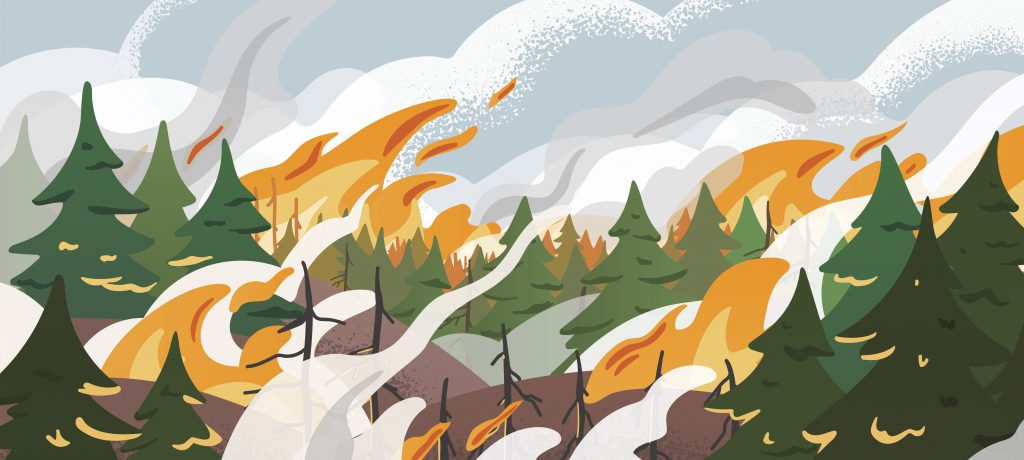
In the past year, wildfires across the globe have covered the front pages of our newspapers. With devastating losses in the Amazon rainforest, Australia, California and other areas, newspapers have continuously broken news of these fires while making an immediate connection to the climate crisis, sparking further political debate as to whether these fires are truly a result of climate change. After the first wave of reporting, major factors in the origin of the fires included farmers burning land at the encouragement of President Jair Bolsonaro in the Amazon, arson in Australia and several cases of misused technology in California. While none of these appear outwardly natural, the continual proposition that the wildfires and climate change are mutually exclusive perpetuates a dangerous tendency of separating anthropocentrism from the state of our climate.
The fact that these wildfires are started by humans doesn’t mean that the fires are in no way affected by global climate change. Fires are fueled by record-high seasonal winds, drying of forest vegetation and increasing temperatures. Several news articles highlight the benefits of controlled burning and undermine the seriousness of environmental refugees by pointing to a similar, unavoidable climate disaster of the future. These articles simply serve to belittle the true gravity of our changing environment.
The political controversy of climate change stems from a misunderstanding of the term “nature,” which is popularly regarded as all that is not man-made. There are often phrases in support of man “becoming one with nature” as opposed to respecting its boundaries. For this, we can thank a historical appraisal of philosophers such as Henry Thoreau and Ralph Waldo Emerson. While these interpretations are seemingly innocuous, they remain largely ignorant of a relationship with nature that has been anything but peaceful.
In order to better understand and combat climate change, we must first reconsider the definition of nature. When we regard nature as the entities that humanity does not encroach upon, we promote the idea that humans have not consistently made devastating and life-altering changes to their surroundings for capitalist gain. Looking at nature as an equally respectable body in comparison to humanity opens up a reconsideration of agency, which is not solely obtainable by humans. Agency can primarily be defined as a potential for influential action, but its connotation involves a human-specific cognitive process. However, nature is fully capable of acting and reacting as humans do. This inclusive perspective of agency also better allows us to connect causal human activity to these milestone events within our climate.
Although combating the climate crisis depends heavily on protective and preventive measures, it is also important to take caution before acting in conservationist efforts. Activists frequently appear eager to protect areas of land they view as subject to exploitation, but conservation efforts can also harm those living around these areas. Non-governmental organizations (NGOs) are notorious for preserving large estates without regard to those who may heavily rely on access to such areas for sustenance or protection. These organizations run independently from any government influence and are not-for-profit, so it should not come as a surprise that NGOs are often run at the hands of donors — including those who have little experience with the disparity among the rich and poor during the climate crisis. Rob Nixon, Currie C. and Thomas A. Baron family professor in the humanities and the environment at Princeton University, calls these magnified effects of climate change and ecological racism “environmentalism of the poor.” Many of the organizations are motivated by the Enlightenment ideas of nature as innately violent and in need of governance or protection, which is observed in the heavy reliance on Thomas Hobbes and John Locke’s violent definition of a “state of nature” in political settings.
By highlighting the dangers of certain conservation efforts, I am not suggesting we refrain from acting on local climate crises or condemning all protections set thus far. There are certainly several regulations in place that do much to protect areas that would be otherwise vulnerable to manipulation. However, I am advocating for a shift in attention from communal impacts to corporate ones. The communities that are most affected by climate change often contribute the least to it, and it is essential to place criticism correctly in a time where very few key players are willing to accept fault. Starting the new election year, I am hopeful for fewer misleading headlines and larger voter turnout because with our climate’s current condition, there is quite literally no time for denial.
Kaitlyn Liu is a sophomore majoring in English.



